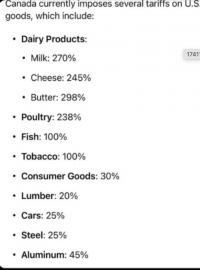StmarysCity79
Well-Known Member
It shows what other counties set as tariffs, it isn't that hard to understand. Do better yourself
Back on February 25, the Office of the United States Trade Representative published in the Federal Register a request for public comments on reviewing and identifying any unfair trade practices by other countries. The register notice specified, “USTR is particularly interested in submissions related to the largest trading economies, such as G20 countries, as well as those economies that have the largest trade deficits in goods with the United States, including Argentina, Australia, Brazil, Canada, China, the European Union, India, Indonesia, Japan, Korea, Malaysia, Mexico, Russia, Saudi Arabia, South Africa, Switzerland, Taiwan, Thailand, Türkiye, United Kingdom, and Vietnam. These countries cover 88 percent of total goods trade with the United States.”
More onTARIFFS
Talk of Magical Stimulus Checks Coming to You Soon
The Heritage Foundation Was One of Free Trade’s Strongest Supporters
Trump Prepares for His Very Own Mission Accomplished Day
Australia: “Since July 2018, GST [Goods and Services Tax] of 10 percent applies to sales of low value imported goods to consumers.”
Brazil: “Imports are subject to several taxes and fees in Brazil, which are usually paid during the customs clearance process. There are three taxes that account for the bulk of import costs: Import Duty, Industrialized Product tax, and Merchandise and Service Circulation tax. In addition to these taxes, several smaller taxes and fees apply to imports. Note that most taxes are calculated on a cumulative basis.”
Canada: “U.S. companies shipping to Canada should be aware that Canada’s de minimis threshold is Canadian $40 (approximately US $31) for taxes and Canadian $150 (approximately US $116.50) for duties. By comparison, in March 2016, the United States raised its de minimis threshold from US $200 to US $800. Some stakeholders, particularly shipping companies and online retailers, maintain that Canada’s low de minimis threshold creates an unnecessary trade barrier.”
So what about Mexico that charges no tariffs on US consumer goods?

